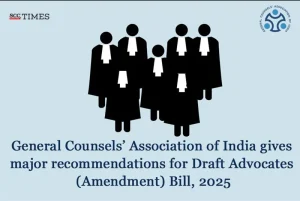In the run-up to the decision to amend the Advocates Act, 1961, whereby the Government of India released draft Advocates (Amendment) Bill, 2025, for public consultation; the General Counsels’ Association of India (GCAI), in its letter dated 23-2-2025 to the Ministry of Law and Justice, gave certain recommendations/suggestions to be incorporated in the draft Bill.
Public consultation on the draft Bill from the stakeholders is open till 28-2-2025.
Key Recommendations by the GCAI
-
Legal Practitioner and Advocate
-
The GCAI has suggested that the definition of Legal Practitioner which covers Law Graduates doing legal work in organizations should be limited to organizations that are “incorporated and registered in India”.
-
Legal Practitioners engaged in the “Practice of Law” in any private or public organization (including corporate entities), may opt to enroll and remain on the rolls and be regarded as “Advocates” during their employment; and thereafter be permitted to appear only for their employer during the duration of their employment.
-
The experience of a Legal Practitioner in the “Practice of Law” shall be validated by the respective State Bar Councils and Bar Associations, Courts/Tribunals/Quasi-judicial forums on basis of certification by any organization in which they engage in the “Practice of Law”.
-
GCAI clarified that Legal Practitioners may choose not to enroll as “Advocates” and can continue in the “Practice of Law” provided they may represent only before such authority which specifically allows non-Advocates to appear before them.
-
GCAI also emphasised that the distinction between “Advocate” and “Legal Practitioner” should be kept as envisaged in the Amendment Bill.
-
-
Legal Practitioner and Legal Privilege
-
GCAI suggested that vis-a-vis Section 134 of Sakshya Adhiniyam, 2023, Legal Practitioners should be considered as “legal advisor” and enjoy the same privilege of confidentiality in respect of legal advise and communications with their organizations.
-
-
Right to Practice Law
-
It was suggested that with the expansion of definition of ‘Legal Practitioner’, Section 29 of the Advocates Act, which currently states that “Advocates to be the only recognized class of persons entitled to practice law”, should be amended in the following manner:
Legal practitioners to be the only recognised class of persons entitled to practise law – Subject to the provisions of this Act and any rules made thereunder, there shall, as from the appointed day, be only one class of persons entitled to practise the profession of law, namely, Legal Practitioners.
For avoidance of doubt, it is clarified that the Legal Practitioner shall be entitled to practice and enroll under this Act or revive his/her enrollment/ Sanad which was surrendered for taking up full time employment in accordance with the Rules.
For the purposes of this Act, any Legal Practitioner who remained in full time employment shall be deemed to have practiced for the period during which the Legal Practitioner was engaged in the Practice of Law.
-
GCAI further suggested that Section 33 of the Advocates Act, 1961 should likewise be appropriately addressed.
-
-
Conduct of Legal Practitioners
-
GCAI suggested that appropriate Code of Conduct may be advised for the Legal Practitioners who seek experience certification from the concerned authorities like the Bar Council of India, State Associations or State Bar.
-

